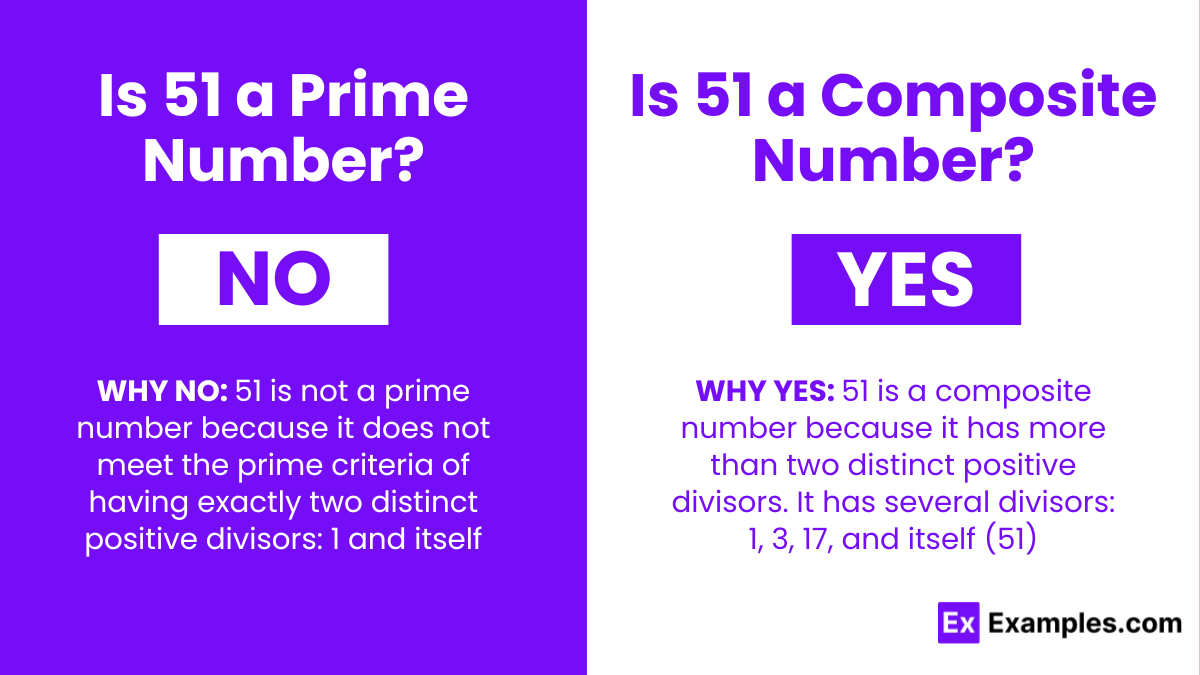Is 51 a prime number or a composite number?
Prime
Composite
Neither
Both


No – 51 is not a prime number.
Why No: 51 is not a prime number because it does not meet the prime criteria of having exactly two distinct positive divisors: 1 and itself. Instead, 51 has divisors 1, 3, 17, and 51.Use this prime number tool to see if any number is Prime or not
YES – 51 is a Composite Number
Why Yes: 51 is a composite number because it has more than two distinct positive divisors. It has several divisors: 1, 3, 17, and itself (51).
| Property | Answer |
|---|---|
| Is 51 a prime number? | No |
| Is 51 a composite number? | Yes |
| Is 51 a perfect square? | No |
| Factors of 51 | 1, 3, 17, 51 |
| Multiples of 51 | 51, 102, 153, 204, 255, 306, 357, 408, 459, 510 |
| Cube Root of 51 | Not a whole number |
| Square of 51 | 2601 |
| Square Root of 51 | Not a whole number (Approximately 7.141) |
| Is 51 a Perfect Cube? | No |
| Is 51 an Irrational number | No |
| Is 51 a Rational number | Yes |
| Is 51 a Real number | Yes |
| Is 51 an Integer | Yes |
| Is 51 a Natural number | Yes |
| Is 51 a Whole number | Yes |
| Is 51 an Even or odd number | Yes (51 is an odd number) |
| Is 51 an Ordinal number | Yes |
| Is 51 a Complex number | Yes (as all real numbers are also complex numbers) |
The factors of 51, which include 1, 3, 17, and 51, represent the set of numbers that can divide 51 evenly, highlighting its composition beyond just being a prime.
51 is recognized not as a prime number but as a composite number because it has divisors other than 1 and itself, specifically 1, 3, 17, and 51. This distinguishes it from prime numbers, which have exactly two distinct positive divisors. While the number 51 may not be as frequently associated with harmony or spiritual significance in various cultures as some numbers, it serves as a reminder of the diversity and utility of numbers in mathematics. Its status as a composite and odd number underscores the variety of numerical properties and their applications in different fields, highlighting the integral role of mathematics in understanding the world around us.
The closest prime numbers to 51 are 47, just below it, and 53, just above it, showcasing their proximity to 51 in the sequence of prime numbers.
No, 2 is not a factor of 51. Factors are whole numbers that divide another number evenly, and 2 does not divide 51 evenly.
Yes, 51 is divisible by several numbers, specifically 1, 3, 17, and 51 itself. These numbers can divide 51 evenly without leaving a remainder.
Text prompt
Add Tone
10 Examples of Public speaking
20 Examples of Gas lighting
Is 51 a prime number or a composite number?
Prime
Composite
Neither
Both
Which statement is correct about the number 51?
It is a prime number with exactly two factors.
It is a composite number with more than two factors.
It is neither prime nor composite.
It is a prime number because it is odd.
What is the smallest prime number that divides 51?
2
1
3
7
Which characteristic confirms that 51 is a composite number?
It is less than 100.
It has exactly two distinct positive divisors.
It can be divided by 3.
It is divisible by numbers other than 1 and itself.
If you divide 51 by 3, what type of number do you get?
Prime
Composite
Odd
Whole
Which of the following is a prime factor of 51?
1
5
15
17
Is 51 a prime number based on its divisors?
Yes, because it has exactly two factors.
No, because it has more than two factors.
Yes, because it is odd.
No, because it is greater than 30.
What type of number is 51 if it can be expressed as a product of prime numbers?
Prime
Composite
Odd
Whole
What is the result when 51 is divided by 17?
3
5
10
17
Which of the following numbers is a prime factor of 51?
1
51
17
50
Before you leave, take our quick quiz to enhance your learning!

